Topic: Redistricting

Interview of Marvin Barkis, October 27, 2017
Interviewed by H. Edward (Ed) Flentje
Marvin Barkis discusses, in detail, the various processes within the House of Representatives in its day-to-day work. He points out differences in working as the majority versus the minority party and talks about working with the governors during his terms in office. When Barkis was the minority leader, he tried to build a sense of community among party members to facilitate working together. Barkis also made changes in legislative procedures to promote efficiency. Much of the interview addresses these internal procedures. Marvin Barkis' primary legislative passion was children’s issues and the interview covers the various attempts to Show Morework on a variety of topics to aid children. He was also involved with school finance, reapportionment, and the death penalty. Show Less

Interview of Rochelle Chronister, January 22, 2015
Interviewed by Burdett Loomis
Rochelle Chronister quickly rose to a leadership position after her election in 1978. She was responsible for recruiting many Republican women to the legislature. She talks in the interview about her job as Assistant Majority Leader and recruitment. Her description of how the Appropriation committee works shows how she became interested in SRS from handling their budget, and that led to becoming Secretary of SRS under Governor Graves. There is one example of her research skills in developing a new program on mediation. She downsized SRS as Secretary and worked on changing the culture of Show Morea highly bureaucratic organization. She worked to ensure that her female colleagues were included and worked across the aisle on numerous measures. She concludes the interview by talking about her family and how they responded to her being away so much. She once chartered a plane to get home in time to attend her daughter's tea. That Chronister was an effective legislator and politician is clear from reading this interesting interview. Show Less
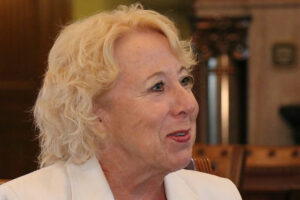
Interview of Christine Downey, August 2, 2019
Interviewed by Dale Goter
Former State Senator Christine Downey recalls her three terms in the Kansas Senate (1993-2004) during her 2019 oral history interview. With her background as a teacher, education issues were important to her as the era of school-funding litigation continued. She was involved in water-related policy making, in particular at the nexus of water quality and agricultural practices. She recalls her service in the Senate and on the Kansas Board of Regents first developing the policy and then implementing fundamental changes to the postsecondary education system. Ms. Downey discusses numerous instances of working across the aisle Show Moreto accomplish policy objectives that did not break on strict party lines. Show Less
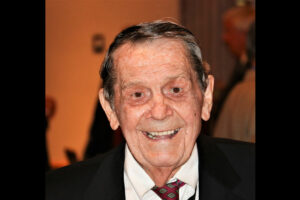
Interview of Jack Euler, April 22, 2015
Interviewed by Burdett Loomis
Jack Euler talks about his ten years in the Legislature and the formal and informal leadership dynamics he witnessed. Euler notes the changes in the Legislature that began with initial implementation of the one person, one vote principle as the basis for legislative districts rather than the county-based system that had existed since statehood. He describes how redistricting gradually changed the urban-rural dynamic of the House. Euler also reflects on the influence of lobbyists on both legislation and leadership in the House.
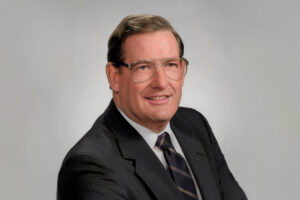
Interview of Carl Holmes, September 3, 2020
Interviewed by Rex Buchanan
In this 2020 oral history interview, former State Representative Carl Holmes discusses his observations of state water policy formulation in the 1970's through 2012. Holmes began his involvement in water policy as a farmer and active member of his community in southwest Kansas. In many respects, his experiences reflect the water-energy nexus. Holmes describes how he had observed cities and irrigators mining water in southwest Kansas. He recalls developing a comprehensive understanding of water issues by interviewing the managers of the state’s water resources. In this interview, Holmes describes how he managed the House Energy and Natural Resources Committee by Show Morecreating subcommittees and educating members on how to work bills and guide them through the process. He discusses his bipartisan work with Representative Ken Grotewiel and other committee Democrats in the 1990s, actions that resulted in the Speaker removing him from the chairmanship of the committee. Holmes describes how irrigation changed over time from flood to sprinklers and how the sprinkler systems have become more efficient. However, Holmes observed that groundwater levels continue to decline leading to abandoned wells, the growing of crops that require less water, the return to dryland farming, and, for some, the call for diversion of water from distant sources, such as the Missouri River, to sustain farming and communities on the plains. Show Less

Interview of Fred Kerr, March 30, 2015
Interviewed by Burdett Loomis
This is the first of two oral history interviews of Fred Kerr in this collection. (Ed Flentje conducted the second interview 2018.) Kerr reflects on his 15 years in the Kansas Senate representing the 33rd Senate district. He recalls Senate leaders and fellow Senators who helped him as a freshman and the influence of those mentors on his career. Fred talks extensively about the process involved in securing a leadership position in the Senate and the dynamics of leadership races. He also reflects on the urban-rural divide in Kansas politics that during the late Show More1970s and early to mid 1980s was often more of a force than the partisan divide. A version of this interview is also posted on KansasMemory.org, the website of the Kansas Historical Society. A more recent oral history interview of Fred Kerr is here. Show Less
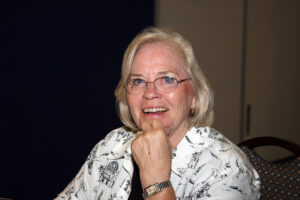
Interview of Janis Lee, October 14, 2019
Interviewed by Joan Wagnon
Former State Senator Janis Lee's 2019 oral history interview covered her 22 years in the Kansas Senate as well as several years on the Kansas Court of Tax Appeals (formerly the Board of Tax Appeals and later returned to that name). The interview covers many topics, including how she campaigned in a rural district that increased in area over those 22 years, driving as much as 45,000 miles in an election year. Lee developed expertise in tax issues that was important to the agriculture community and in funding rural schools. Water supply was an important issue in her district, Show Moreas was adapting federal regulations so they would work in rural communities. She witnessed the shift to a more conservative legislature and more anti-abortion legislation. Funding for schools dominated most sessions.
Highlight -- short excerpt from the interview
Show Less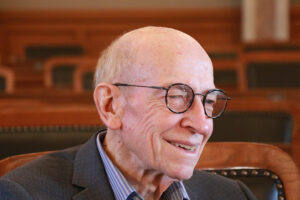
Interview of James (Jim) Maag, July 17, 2014
Interviewed by Burdett Loomis
In this 2014 oral history interview, Jim Maag reflects on his service in the Kansas House of Representatives (1969-1976) including his term as Speaker Pro Tem (1975-1976). It was a time of significant change and modernization of the Kansas Legislature and its processes. Maag provides a clear view into the evolution of the Legislature into a more professional organization. He comments on the bipartisan approaches to policymaking during that era when the urban-rural split affected the dynamic more often than purely partisan considerations. He was witness to the impact of the one person, one vote Show Morecourt case as well as the increased number of women legislators and the reduced number of attorneys. Jim's recollections draw a vivid picture of an institution in transition. His connection with the Legislature continued in his role of legislative liaison for Governor Bennett and later as a lobbyist for the Kansas Bankers Association. Show Less
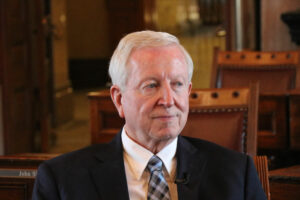
Interview of Steve Morris, July 15, 2020
Interviewed by Joan Wagnon
Senate President Steve Morris gives a lengthy and detailed account of his twenty years in the Senate and his eight years as president. A former Hugoton school board member, Morris challenged a 16 year incumbent Democrat (Leroy Hayden) and won by a 2:1 margin in the 1992 election. During this period there were several high profile issues which Morris championed. Casino gambling passed in 2007 after a 12 hour filibuster. A coal-fired plant (Sunflower Electric) in Holcomb wanted to expand but Governor Sebelius vetoed that bill, twice. The Special Session of 2005 dealt with a Show MoreSupreme Court order to increase education funding to constitutional levels which took 12 days to develop a consensus. A 2010 transportation plan was passed during a recession. Morris initiated a three-university plan to increase the number of engineers in the state by 65 percent beginning in 2011, assisted by Senator Carolyn McGinn. Governor Sam Brownback's "tax experiment" which was passed in 2012 took huge amounts out of the transportation plan to close budget gaps. The interview contains a detailed account of the shenanigans that took place after the Senate refused to pass the Brownback bill. The Governor pleaded with Morris to reverse their action and send the bill to conference, which Morris did, only to find the House concurring to pass the original bill. Morris ran again, but was defeated in a Republican primary. Show Less

Interview of Jo Ann Pottorff, October 9, 2020
Interviewed by Patty Clark
Former Kansas State Representative Jo Ann Pottorff describes her best legislative work as getting the Parents as Teachers program passed. With her background in education, she saw opportunity for this program to make a difference for children. Pottorff’s policy interests were education, financing the work of the legislature, and funding schools. In order to pursue those interests, she secured an assignment to the House Appropriations Committee early in her tenure. Over the course of her service in the Legislature her interests broadened. Pottorff was assigned to the Joint Committee on State Building Construction, which she chaired for a Show Moretime, and as a member of that Committee was involved in the renovation of the Capitol building. At the national level, Pottorff worked with National Conference of State Legislators (NCSL) and the Women's Legislative Network which allowed her to meet other women in office and to travel internationally, to Korea, Japan, Taiwan, and Germany. Pottorff describes the changes in the culture of the legislature during her years of service (1985-2012). She notes the rise in partisanship and inter-party divisions evidenced by the fact that she was often targeted in a Republican primary election when she sought renomination. Show Less
